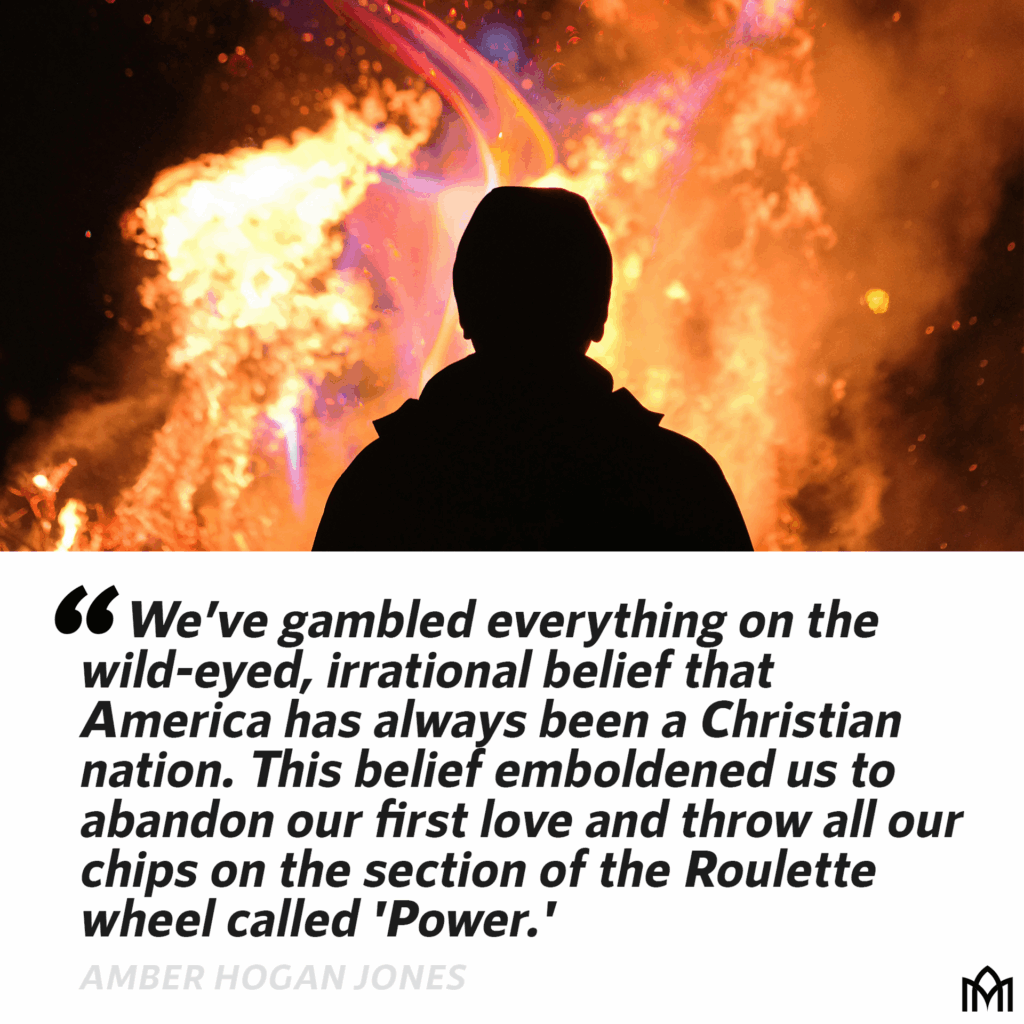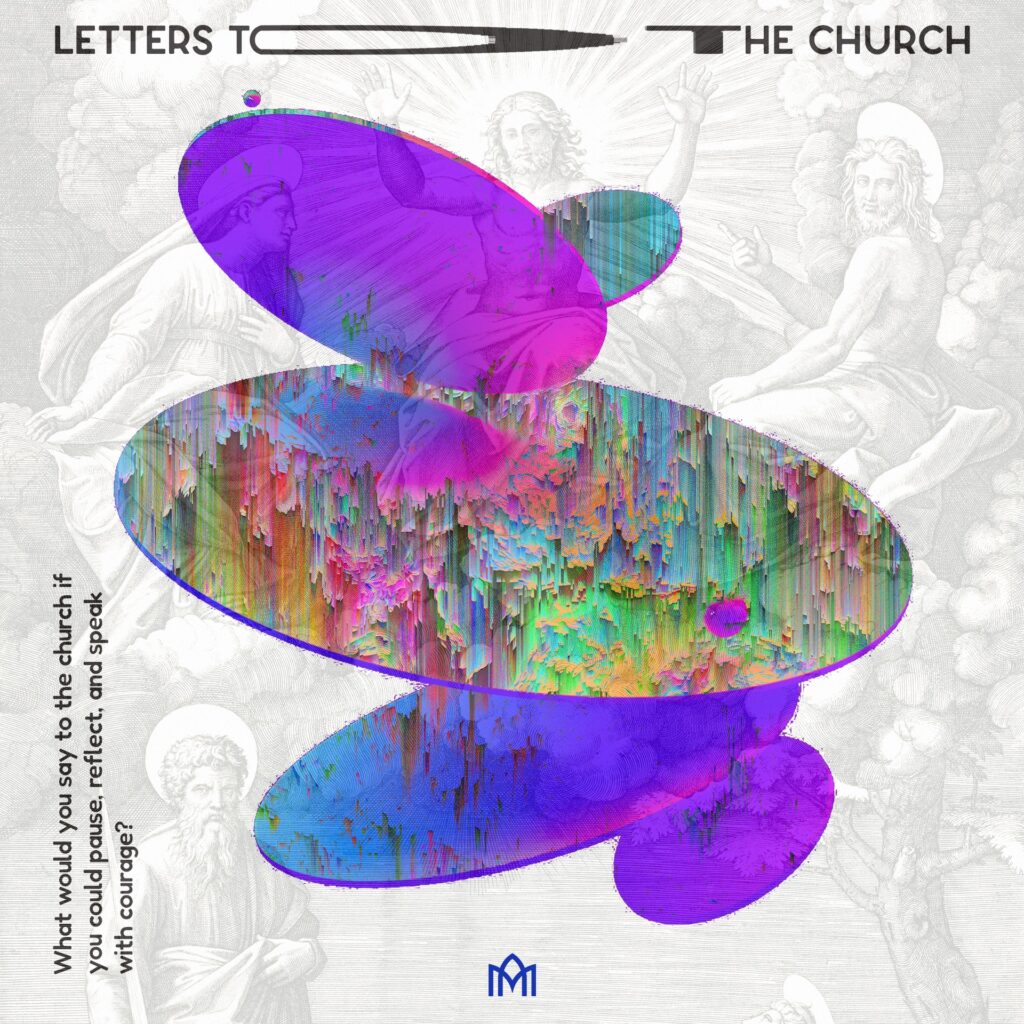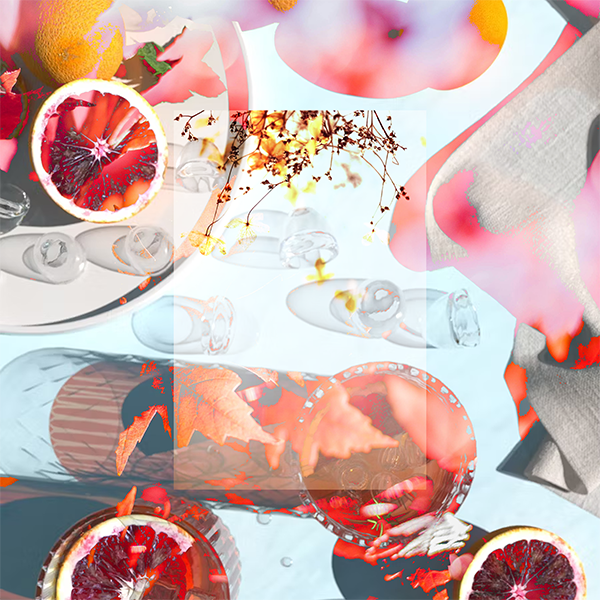The Bill For Our Recklessness Has Come Due
The Nourishment of God’s Womb for the Church
To the Reckless Church in America,
The thing which we’ve greatly feared has come upon us, sisters and brothers. We’ve racked up incalculable costs through decades of turning a blind eye to abuses inside the Church, of fostering political syncretism on both sides of the aisle, of maintaining the status quo by bolstering oppressive doctrines, and of ignoring cries for help from those on the margins.
We’ve gambled it all on the wild-eyed, irrational belief that America has always been a Christian nation and, therefore, Christendom would always enjoy being at the head of the Worldview Table. This belief emboldened us to abandon our first love1Revelation 2:4-5 (NRSV): “But I have this against you, that you have abandoned the love you had at first. Remember, then, from where you have fallen; repent and do the works you did at first. If not, I will come and remove your lampstand from its place, unless you repent.” (See Revelation 2:4-5, NRSV) and throw all our chips on the section of the Roulette wheel called “Power.”
And now, the bill for our recklessness has come due.
Namely:
- Forty million Americans have stopped going to church in the last quarter of a century.2The Great Dechurching (2023), by Jim Davis and Michael Graham, explores the reasons Americans are leaving the Church, and explains this statistic. In addition to abuse and corruption, folks are leaving church because they find it irrelevant to the realities of their daily lives in America.
- Gen Z women, particularly, are leaving the Church in droves, citing cultural misalignment and unfair treatment of women as leading factors in their decision.3Survey Center on American Life, 2023.
When we look at the data, and listen carefully to the voices of those who want nothing more to do with Christendom, we discover that many people, especially young women, see the Church as unsafe and/or irrelevant to their realities. While their mothers and grandmothers may have worked overtime to break glass ceilings within the Church, and to prove their equal status and worth theologically and practically–all while keeping the everyday life of the Church running smoothly, as women have always done–younger generations are simply less interested. As my newly minted adult daughter recently said to me, “It’s weird to think I have complete freedom to be who God has made me to be in society but then that could be taken from me in the church.”
Weird, indeed.
Even if we’re not convinced that scores of folks leaving the Church is a good enough reason to raise an alarm, the ones staying within its walls are struggling too. Consider the following statistics, which taken as an aggregate, are staggering in their implications for the (un)health of the church.
- Research reveals that 18% of pastors admit to currently using porn, and 81% acknowledge that their churches are not adequately addressing problematic sexual behavior.4Barna Group, The Silent Problem of Pornography Use Among Pastors, November 22nd, 2024.
- One in five senior Protestant pastors have considered self-harm and/or suicide in the past year.5Barna Group, Pastors, Too, Grapple with Thoughts of Suicide and Self-Harm, September 12th, 2024.
- Only 32% of Americans stating they have a great deal of trust in the institution of the Church.6Pew Trend Magazine, Data Behind America’s Waning Trust in Institutions, October 17th, 2024 U.S. rates of institutional mistrust now exceed those of many other nations.
- 32% of Protestant churchgoers believe many more Protestant pastors have sexually abused children or teens than has currently been exposed, according to the Evangelical Council for Abuse Prevention.
- “Among Americans who attend religious services weekly or more, a majority (52%) are Christian nationalist Adherents or Sympathizers, compared with 38% of those who attend a few times a year and 18% of those who seldom or never attend,”7See https://www.prri.org/research/support-for-christian-nationalism-in-all-50-states/. according to research conducted by non-partisan organization Public Religion Research Institute (PRRI).
Public trust in the Church is waning as we grapple with moral failure, mental health issues, political division, and a reckoning for the ways we’ve historically harmed women and children.
It seems we’ve arrived at a threshold moment, sisters and brothers. It’s the point at which we must decide to stay on the side of familiarity which has hurt and disenfranchised so many, or step over into the deeply uncomfortable realm of the unknown that might offer freedom and new life to us all. What these dark times call for isn’t simply another conference, cleverly written book, or podcast to discuss our ills. We need something much more radical and thorough than what business-as-usual has provided.
Yet, this isn’t entirely new territory. In His conversation with a seeking man named Nicodemus, Jesus framed it for us this way–we must be born from above to see the Kingdom of God (See John 3:1-10). And when Nicodemus, speaking for us all, pushed back by asking, “Can one enter a second time into the mother’s womb and be born?” (John 3:4) Jesus reiterated His point by stating: “No one can enter the Kingdom of God without being born of water and the Spirit. What is born of the flesh is flesh, and what is born of the Spirit is Spirit” (John 3:5-6).
In many important ways, the contemporary American Church has been born of the flesh, with its trappings of power, control, oppression, and violence.
In the conversation between Jesus and Nicodemus, the framework by which we might find our way forward emerges. Jesus didn’t provide here a step-by-step guide for how to jump on a bandwagon of outrage, or virtue signal our way to acceptance, or cancel those among us who have offended most egregiously. No, Jesus simply offered this truth: we are all in the same need of a complete factory-reset. Across this unwelcome but desperately needed threshold, we must submit ourselves to a Divine re-wombing, a gestational period in which we are hosted by the Spirit of God in an intimate and creative space of healing, and from which we emerge with the kind of new life that’s contagious in the world.
We’ve gambled it all on the wild-eyed, irrational belief that America has always been a Christian nation and, therefore, Christendom would always enjoy being at the head of the Worldview Table. Share on X
The Womb of God
The Hebrew word for womb is the noun rehem, which is derived from the verb of the same spelling, pronounced racham or rachamim.8“H7358 – reḥem – Strong’s Hebrew Lexicon (niv).” Blue Letter Bible. Accessed December 1st, 2024 at https://www.blueletterbible.org/lexicon/h7358/niv/wlc/0-1/. Rachamim is translated as compassion and is a highly emotion-laden word used to describe God’s character in the Hebrew Bible.9Exodus 34:6; See also Nehemiah 9:27-28, Isaiah 49:15-16, Jeremiah 31:20, and Psalm 103:13-14. Perhaps it’s uncomfortable to talk about God’s womb because of several millennia of misguided reinforcement that God is synonymous with maleness. No doubt, this insistence on God’s male attributes is at least partially to blame for women distancing themselves from the Church. After all, where are women to find themselves in the Imago Dei? But it goes deeper than that. Our lack of capacity to imagine our God’s womb–that place of ultimate love, healing, and belonging–is at the root of the evils plaguing us.
As many Christian denominations have continued to react to cultural shifts by doubling down on doctrines of female subordination and stripping women of their voices and vocations, a low regard for the feminine has been revealed in all its devastation. Yet, this rejection of the feminine has far-reaching consequences for men too. The notion of being re-wombed by God implies vulnerability to the uttermost, a laying down of all one’s defenses, survival instincts, and devices of control. Nicodemus, a man of influence, was baffled by the notion because that kind of vulnerability was unconscionable for men then, just as it remains so today. The invitation Jesus extends to us is one of immense freedom (Imagine the relief of laying down the burdens of control and power!) but requires an inner courage to accept that is by no means easy to access.
Lest we think the idea of God’s womb is some post-modern, feminist contrivance, consider this from none other than 16th-century Protestant Reformer John Calvin, writing in his classic commentary on Isaiah:
“Shall a woman forget her child! In order to correct that distrust, he adds to the remonstrance an exhortation full of the sweetest consolation. By an appropriate comparison, he shews how strong is his anxiety about his people, comparing himself to a mother, whose love toward her offspring is so strong and ardent, as to leave far behind it a father’s love. Thus, he did not satisfy himself with proposing the example of a father, (which on other occasions he very frequently employs,) but in order to express his very strong affection, he chose to liken himself to a mother, and calls them not merely ‘children,’ but the fruit of the womb, towards which there is usually a warmer affection. What amazing affection does a mother feel toward her offspring, which she cherishes in her bosom, suckles on her breast, and watches over with tender care, so that she passes sleepless nights, wears herself out by continued anxiety, and forgets herself! And this carefulness is manifested, not only among men, but even among savage beasts, which, though they are by nature cruel, yet in this respect are gentle.”10John Calvin, Commentary on Isaiah 49:15.
In the Prophet Isaiah’s visions, Calvin sees a God who establishes trust with us by cherishing us within God’s bosom, suckling us at God’s breasts, watching over us with tender care, and forgetting all else while brooding over our well-being. What a beautiful, powerful, and overtly feminine picture of the love of God; one which, no doubt, resonates with us all on a primal level if we will only allow.11This recalls Matthew 23:37 when Jesus refers to Himself as like a mother hen: “Jerusalem, Jerusalem, you who kill the prophets and stone those sent to you, how often I have longed to gather our children together, as a hen gathers her chicks under her wings, and you were not willing.” Yet, despite God using a word to describe God’s self which means something akin to womb-like and supplying ample imagery within the Scriptural Canon of a mothering sort of divine love, we have difficulty conceptualizing this, much less accepting it as a legitimate way God relates to us.12See also Gen 7:1, Deut 32:18, Job 38:8, Job 38:28-29, Isaiah 42:14, Isaiah 46:3-4, John 1:12, John 4:7, and John 16:21, to name only a few other places where Scripture refers to God in mothering, womb-like, birthing terms. Our own cognitive biases are blocking us from understanding a fundamental aspect of God’s character, and thus receiving the gift of God’s womb-likeness in our own lives. And our starvation for the nourishment that comes only from God’s womb is keeping us all in a state of distrust so profound that we reach for security in all the wrong places.
Sue Monk Kidd, in her 2016 classic The Dance of the Dissident Daughter, suggests, “The core symbols we use for God represent what we take to be the highest good…These symbols or images shape our worldview, our ethical system, and our social practice–how we relate to one another.” The symbol of God’s womb supplied to us by Scripture, and the imagery of being born again given to us by Jesus, contain power for shaping how we move through this fractured time as the Family of God. We cannot philosophize, theologize, professionalize, or intellectualize our way into being re-born. We must abandon ourselves to the process of being re-wombed so that we may emerge as God-trusting people who are, by extension, sources of trustworthiness in a lost and dying world.
The notion of being re-wombed by God implies vulnerability to the uttermost, a laying down of all one’s defenses, survival instincts, and devices of control. Share on X
Nourishment from God’s Womb
Rachamim–“being womb-like”–means being attached to another in an intimate, nourishing way, without expectation of reciprocity. What a generous gift we’re being offered by our God! Being brought back into God’s womb is being brought back to the Source of all we need for healing and wholeness. And yet this process of rebirth begins with a sort of death. We first must repent of the collective choices we’ve made that have led to our malnourishment. The crippling immaturity and festering woundedness of our culture often lead us to believe that our only recourse in the face of sin is to severely condemn and publicly shame those who do wrong. But a re-wombing requires not only a sober assessment of what is wrong, but also an open-armed and open-minded hopefulness in a God who can still do miracles in human hearts when given the time, space, and willingness of the people. It’s up to us to create the space, give the time, and offer our willingness in cooperating with God’s Spirit to foster this transformative process, of which there are at least five core components:
- Trust: If we only understood how fragile trust is and how careful we must handle it, this alone could transform the Church. God intended for trust to be emergent, meaning we are designed to continue to grow in trust with each experience, risk, and interaction we have with God and others. When we create contexts in which we can risk uncertainty, ask hard questions, tell brutal truths, listen to heartbreaking stories, and experience the challenge of new ideas, we are fostering an environment where trust can be built.
- Reliability: As we take risks together, companioned by the loving Presence of God, we make room for reliability to be proven. There is great power in offering faithfulness to one another and learning to rely on God-in-others to meet our deepest human needs. Fruits of the Spirit, including kindness, goodness, patience, and gentleness supply the nutrients we need to grow. We can create spaces where these nutrients are valued as deeply as our most cherished speculative theologies and make them a priority in our Church culture if we see them as essential to our lives and not mere spiritual accessories that we discard at our convenience.
- Protection/Fierce Resistance: The womb of God is a place of protection from harm, a fierce resistance against anything that is not beneficial to the wholeness and well-being of the lives within. For too long, we’ve adopted purification stories that condition us to keep out the “poison” of the world by scapegoating others who we don’t understand, who are often the very ones who need sanctuary the most! We’ve conceptualized protection as ‘against-ness,’ creating a false binary of us vs. them myths that keep us in a frenzy of boundary maintenance. Meanwhile, we’ve allowed the worst poisons to enter our sanctuaries under the guise of godliness. Our re-wombing must include standing our ground against the abuse and mistreatment of all, especially the most vulnerable among us. Healthy growth cannot happen when people are under threat, making cooperation with God’s fierce mothering love essential. Rather than being conditioned as soldiers in corporately contrived culture wars, we must fight the good fight for safety in our own sanctuaries.
- Space of Creation: The most important work done in the womb is that of creation. In God’s womb, our disintegrated parts are woven together into an integrated whole. The necessary work of deconstructing has been done and the time for reconstructing is upon us. Instead of expending our nutrients and energy on boundary maintenance that keeps certain people out and allows certain others in, womb-like compassion invites us to discover what’s possible when we allow everyone a place and a voice. How might we see our own stories (and by expansion, the Story of God) differently and more richly if we listen to others whose perspectives are foreign to our own?
- Agitation: When it’s time for the womb to bring forth life into the world, it is with great agitation, pain, and labor. Every ounce of energy is required, every cell and muscle and bone must contribute to the violent and beautiful process. It is messy and raw and skirts the boundary line between life and death. When we are re-wombed to be born again, we are caught up in what God is birthing into the world–which is ultimately love. When love is thrust into a world darkened by hatred and those two powerful forces collide there will always be agitation. The vulnerability of re-wombing requires that we accept the deep discomfort of being caught in this rumbling and that we remain committed to the goal of love, no matter the certainty and loss of control it costs us.
Bear Fruit Worthy of Repentance
If we can find our way back to the womb of God together, to be nourished and re-created in that Divine space, we can then extend rachamim, womb-like compassion, to the world through incarnational living. When John the Baptist came preparing the way for Christ, he preached a message of repentance and fruit bearing. We often overlook his words: “Bear fruit worthy of repentance” (Matthew 3:8) in his warning to the religious leaders of his time. Certainly, John was rebuking the gatekeepers of the faith in his warning that a new day was dawning in which God was going to cut down every tree that does not bear fruit. The warning resonates for us today. If our religious institutions are not bearing fruit, they need to be cut down. As we survey the religious landscape of American Christendom, we would be blind to deny that the axe is at the root of the tree.
Yet, John wasn’t only issuing a warning but was also extending an invitation. Yes, the tree needs to come down, but we as followers of Christ who have recognized our culpability and have repented of our collective sin now can bear fruit worthy of this repentance. Being re-wombed and nourished by a mothering God, allowing vulnerability to create fresh life unencumbered by addiction to power, and emerging integrated within ourselves and our Churches, we will have something to offer our world that is real, and whole, and thoroughly good. What we’ll have to offer is imperishable, pure love (See 1 Peter 1:22-23).
And this, in all its holy irony, is the most powerful force of all.
~Rev. Dr. Amber Hogan Jones
///
*Editorial Note: Letters to the Church is Missio Alliance’s newest long-form series. The latest letter to our growing collection will go live each Friday throughout the rest of 2025. We invite you to prayerfully listen to the Spirit as you read, asking God what you might say to the Church in your own voice. ~CK
“Anyone with ears to hear must listen to the Spirit and understand what God is saying to the churches.” (Revelation 2:29)
God can still do miracles in human hearts when given the time, space, and willingness of the people. Share on X





